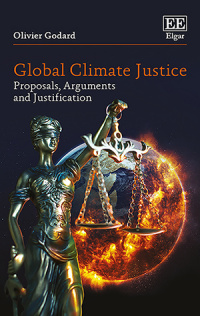Hardback
Global Climate Justice
Proposals, Arguments and Justification
9781786438140 Edward Elgar Publishing
In this thoughtful and original book, social scientist Olivier Godard considers the ways in which arguments of justice cling to international efforts to address global climate change. Proposals made by governments, experts and NGOs as well as concepts and arguments born of moral and political philosophy are introduced and critically examined. Godard contributes to this important debate by showing why global climate justice is still controversial, despite it being a key issue of our times.
More Information
Critical Acclaim
Contents
More Information
In this thoughtful and original book, social scientist Olivier Godard considers the ways in which arguments of justice cling to international efforts to address global climate change. Proposals made by governments, experts and NGOs as well as concepts and arguments born of moral and political philosophy are introduced and critically examined. Godard contributes to this important debate by showing why global climate justice is still controversial, despite it being a key issue of our times.
Godard first points out the huge differences between the foundations of conflicting proposals, for instance between a cosmopolitan viewpoint and an international one. He then explores controversies over climate justice proposals and provides a rigorous criticism of those based on historical responsibility. Finally, he demonstrates how issues of justice are reconfigured by instrumental regimes of coordination, such as a global carbon market. Inspired by the French school of justification, this book shines an insightful light on the failure of climate change debates to develop a convincing standard moral and political theory.
Including elements from systems theory, economics and law, this book will be of interest to scholars and students of moral and political philosophy, economics and social sciences, as well as experts working on climate negotiations and concerned stakeholders.
Godard first points out the huge differences between the foundations of conflicting proposals, for instance between a cosmopolitan viewpoint and an international one. He then explores controversies over climate justice proposals and provides a rigorous criticism of those based on historical responsibility. Finally, he demonstrates how issues of justice are reconfigured by instrumental regimes of coordination, such as a global carbon market. Inspired by the French school of justification, this book shines an insightful light on the failure of climate change debates to develop a convincing standard moral and political theory.
Including elements from systems theory, economics and law, this book will be of interest to scholars and students of moral and political philosophy, economics and social sciences, as well as experts working on climate negotiations and concerned stakeholders.
Critical Acclaim
‘Godard knows the facts, has a very good overview of the philosophical literature on the subject and is perfectly informed about the political discussions of the last quarter of a century. His quest is not for a new justification of global climate justice, but for a way to bring us further than the many already existing conceptions have brought us hitherto.’
– Norbert Campagna, Ethical Perspectives
‘Justice considerations lie at the heart of international discussions to deal with climate change. This timely book, by one of the best scholars and advisors on climate policy, provides a comprehensive, yet rigorously critical (with due emphasis on the peculiarities of the international sphere), account of existing demands on the matter, from “intergenerational equity” to “equal rights for every human being” to the “historical responsibility of the North”. It ends with a new framework, drawn from justification theory, for articulating concrete compromises out of rival viewpoints. A must-read for climate policy makers, advisors, analysts and scholars.’
– Bernard Sinclair-Desgagné, HEC Montréal, Canada
‘For all its details, climate change is fundamentally a moral issue. Godard manages with elegance and sharp analysis to guide us through the big philosophical, economic and political questions.’
– Thomas Sterner, University of Gothenburg, Sweden
‘How to propose a theory of climate justice that takes seriously the need for States to voluntarily agree on a common climate regime? How to apply Boltanski and Thévenot’s approach to justification to this issue? These are two of the many issues addressed in this book. It is the very personal outcome of decades of in-depth work devoted to bridging ideas from international relations, political philosophy, environmental economics and first-hand observations of climate negotiations. Timely and insightful!’
– Axel Gosseries, University of Louvain, Belgium
– Norbert Campagna, Ethical Perspectives
‘Justice considerations lie at the heart of international discussions to deal with climate change. This timely book, by one of the best scholars and advisors on climate policy, provides a comprehensive, yet rigorously critical (with due emphasis on the peculiarities of the international sphere), account of existing demands on the matter, from “intergenerational equity” to “equal rights for every human being” to the “historical responsibility of the North”. It ends with a new framework, drawn from justification theory, for articulating concrete compromises out of rival viewpoints. A must-read for climate policy makers, advisors, analysts and scholars.’
– Bernard Sinclair-Desgagné, HEC Montréal, Canada
‘For all its details, climate change is fundamentally a moral issue. Godard manages with elegance and sharp analysis to guide us through the big philosophical, economic and political questions.’
– Thomas Sterner, University of Gothenburg, Sweden
‘How to propose a theory of climate justice that takes seriously the need for States to voluntarily agree on a common climate regime? How to apply Boltanski and Thévenot’s approach to justification to this issue? These are two of the many issues addressed in this book. It is the very personal outcome of decades of in-depth work devoted to bridging ideas from international relations, political philosophy, environmental economics and first-hand observations of climate negotiations. Timely and insightful!’
– Axel Gosseries, University of Louvain, Belgium
Contents
Contents: 1. Introduction 2. Whither justice? 3. Justice and international coordination 4. Justice and climate change: data and proposals 5. The puzzle of intergenerational equity 6. Historical responsibility for climate change 7. The equitable sharing of a carbon budget 8. Climate justice in the light of justification theory 9. Beyond justice References Index




